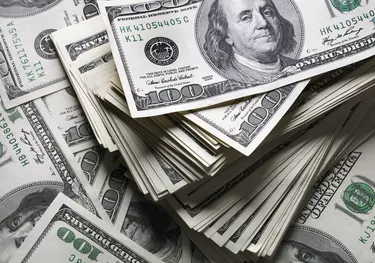
USD in currency discussions stands for United States dollar, the primary currency of the United States. Many currencies have a three-letter abbreviation that can be used to refer to them unambiguously. You can look up exchange rates online using these symbols.
Tip
USD is short for United States dollar.
Video of the Day
What's USD in Currency Terms?
Speaking in finance, USD means United States dollar. Every world currency has an abbreviation established by the International Standards Organization in a publication called ISO 4217. You can look up the abbreviation for a currency in the standards document, which is available online, or on many other financial information sites.
Video of the Day
In addition to USD for the United States dollar, common abbreviations include EUR for the euro used in many European countries, GBP for the Great Britain pound, JPY for Japanese yen and CAD for the Canadian dollar. Using the abbreviations rather than terms like pound or dollar, which can be used for multiple currencies, or abbreviations like the dollar sign ($) helps clearly indicate which currency you're referring to.
If you hear someone simply refer to, say, dollars or pounds in an international context, you would otherwise need to clarify which currency you're talking about. Cryptocurrencies, such as bitcoin and Ethereum, have standard abbreviations within the cryptocurrency world.
Currency Converter Tools
The values of currencies shift over time. You can find currency converter programs online to check the exchange rates, or how much of one currency you get for another, between different currencies. Type or select the name or abbreviation of the two currencies in the appropriate places to see how much one unit of one currency is worth in another.
Currency conversion rates are also published by many financial news and information organizations. If you're considering a transaction in another currency, make sure you check the up-to-date conversion chart to see what it will cost you in your home currency.
Exchange Rates You Pay
The published exchange rate may not exactly mirror what you pay for an international transaction as an individual rather than a bulk currency trader. If you order something from a foreign website or pay with your credit or debit card while traveling abroad, you may get a slightly different exchange rate or pay additional fees compared to what you see published online.
If you trade currency at a currency exchange, such as at an airport or a bank, see how the rates offered compare to the rates you see online. If a transaction is more expensive than you expect because of currency-related costs, you might want to reconsider it.
Investing in Currencies
You can invest in foreign currency in a variety of ways. You can buy foreign currency directly on the forex, or foreign exchange market, betting that the value of it will go up relative to your currency. You can also invest in more complex financial instruments such as options or futures that allow you to place bets on shifts in the relative value of currencies. You can also invest in foreign stocks or bank accounts, such as certificates of deposit, which can carry additional benefits if the foreign currency appreciates in value, relative to your currency.
Currency trading and other currency-related transactions can be rewarding, but they can also be risky. If your bet about the relative values of currencies turns out to be wrong, you can potentially lose a lot of money. Make sure not to invest more than you can stand to risk. Also ensure that you understand the tax and other legal ramifications of your currency-related investments. Consult a lawyer or tax adviser and keep the taxes you may owe in mind as you consider whether a currency trade is a good one.